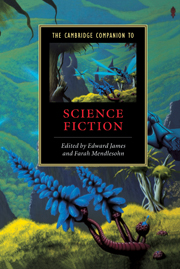Book contents
- Frontmatter
- Introduction
- Part 1 The history
- Part 2 Critical approaches
- Part 3 Sub-genres and themes
- 11 The icons of science fiction
- 12 Science fiction and the life sciences
- 13 Hard science fiction
- 14 Space opera
- 15 Alternate history
- 16 Utopias and anti-utopias
- 17 Politics and science fiction
- 18 Gender in science fiction
- 19 Race and ethnicity in science fiction
- 20 Religion and science fiction
- Further Reading
- Index
- Series List
15 - Alternate history
from Part 3 - Sub-genres and themes
Published online by Cambridge University Press: 28 May 2006
- Frontmatter
- Introduction
- Part 1 The history
- Part 2 Critical approaches
- Part 3 Sub-genres and themes
- 11 The icons of science fiction
- 12 Science fiction and the life sciences
- 13 Hard science fiction
- 14 Space opera
- 15 Alternate history
- 16 Utopias and anti-utopias
- 17 Politics and science fiction
- 18 Gender in science fiction
- 19 Race and ethnicity in science fiction
- 20 Religion and science fiction
- Further Reading
- Index
- Series List
Summary
'Alternate history' - or, as grammatical purists call it, 'alternative history' - is an inaccurate but common label for a small but intriguing body of literature. An alternate history is not a history at all, but a work of fiction in which history as we know it is changed for dramatic and often ironic effect. Often an alternate history dramatizes the moment of divergence from the historical record, as well as the consequences of that divergence. Such a story or novel might seem at first to be a work of traditional historical fiction, in which invented characters and events are woven into the known tapestry of history, but the alteration announces itself quickly, usually in the first few pages.
An example is ‘The Lucky Strike’ by Kim Stanley Robinson (1984), which begins:
War breeds strange pastimes. In July of 1945 on Tinian Island in the North Pacific, Captain Frank January had taken to piling pebble cairns on the crown of Mount Lasso – one pebble for each B-29 takeoff, one cairn for each mission. The largest cairn had four hundred stones in it. It was a mindless pastime, but so was poker.
For several pages, the fictional adventures of Captain January seem to have a nonfictional backdrop, for the setting meshes with the reader’s knowledge, however vague, of the closing months of the Second World War, as US forces in the Pacific ready atom bombs to drop on Japan. Then comes a spectacular moment of divergence, as the horrified January watches a plane in trouble:
Maybe he was trying for the short runway on the south half of the island. But Tinian was too small, the plane too heavy . . . It exploded in a bloom of fire. By the time the sound of the explosion struck them they knew no one in the plane had survived . . . ‘He was going to name the plane after his mother,’ Scholes said to the ground. ‘He told me that just this morning. He was going to call it Enola Gay.
- Type
- Chapter
- Information
- The Cambridge Companion to Science Fiction , pp. 209 - 218Publisher: Cambridge University PressPrint publication year: 2003
- 7
- Cited by



